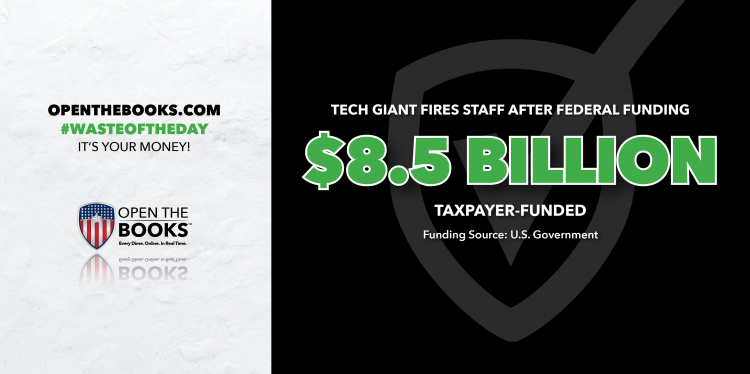Executive
Waste of the Day: Intel’s $8.5 Billion Grant Didn’t Prevent Mass Layoffs
Intel took an $8.5 billion grant and ran, laying of 15,000 workers (15 percent of its workforce) regardless of the grant.

Topline: President Joe Biden’s goal of creating jobs in semiconductor manufacturing is not going as planned.
Intel will lay off 15 percent of its workforce anyway
Technology giant Intel announced that it will be laying off 15,000 workers, even though the company received an $8.5 billion grant from the federal government in March to hire American employees.
Key facts: The CHIPS Act of 2022 provided $39 billion in direct subsidies to tech companies to boost the U.S. chip manufacturing industry. Intel was the biggest beneficiary, and it also got an $11 billion loan meant to support factories in Oregon, Arizona, Ohio and New Mexico.
That wasn’t enough to stop the company from ditching 15% of its workforce.

“Our revenues have not grown as expected – and we’ve yet to fully benefit from powerful trends, like AI. Our costs are too high, our margins are too low,” Intel CEO Patrick Gelsinger said in a press release.
Gelsinger said that since 2020, the company’s workforce grew by 10% but annual revenue fell by $24 billion.
Before the CHIPS Act was passed, Gelsinger suggested the company would move jobs to Europe if it couldn’t secure U.S. federal grants.
Search all federal, state and local government salaries and vendor spending with the AI search bot, Benjamin, at OpenTheBooks.com.
Who gets these grants?
Background: An opinion article in The Hill by Matt Cole and Chris Nicholson claims that “diversity, equity and inclusion” provisions in the CHIPS Act have limited its effectiveness.
Grants are awarded only to companies that “create opportunities for Americans from historically underserved communities” — even if that comes at the expense of profit margins. Cole and Nicholson suggest it’s part of the reason why Intel and Samsung have delayed building factories in Ohio and Texas, respectively.
Others have argued the CHIPS Act doesn’t allocate enough money to have its intended impact.
Because countries like China and Japan are offering similar subsidies, the CHIPS Act won’t be “nearly enough” to help the U.S. meet its goal of producing 20% of the world’s semiconductors by 2030, according to Paul Triolo of the Albright Stonebridge Group.
Triolo and others told the EE Times that a second or third CHIPS Act will be necessary. Perhaps that should be on hold until the first one shows positive results.
Summary: It’s good to stop U.S. jobs from going overseas but not if we’re creating jobs that disappear shortly after they get taxpayer funds.
The #WasteOfTheDay is brought to you by CEO & founder, Adam Andrzejewski, with Jeremy Portnoy. Learn more at OpenTheBooks.com.
This article was originally published by RealClearInvestigations and made available via RealClearWire.
Adam Andrzejewski (say: Angie-eff-ski) was the CEO/founder of OpenTheBooks.com. Before dedicating his life to public service, Adam co-founded HomePages Directories, a $20 million publishing company (1997-2007). His works have been featured on the BBC, Good Morning America, ABC World News Tonight, C-SPAN, The Wall Street Journal, The New York Times, USA Today, FOX News, CNN, National Public Radio (NPR), Forbes, Newsweek, and many other national media.
Today, OpenTheBooks.com is the largest private repository of U.S. public-sector spending. Mission: post "every dime, online, in real time." In 2022, OpenTheBooks.com captured nearly all public expenditures in the country, including nearly all disclosed federal government spending; 50 of 50 state checkbooks; and 25 million public employee salary and pension records from 50,000 public bodies across America.
The group's aggressive transparency and forensic auditing of government spending has led to the assembly of grand juries, indictments, and successful prosecutions; congressional briefings, hearings, and subpoenas; Government Accountability Office (GAO) audits; Congressional Research Service (CRS) reports; federal legislation; and much more.
Our Honorary Chairman - In Memoriam is U.S. Senator Tom Coburn, MD.
Andrzejewski's federal oversight work was included in the President's Budget To Congress FY2021. The budget cited his organization by name, bullet-pointed their findings, and footnoted/hyperlinked to their report.
Posted on YouTube, Andrzejewski's presentation, The Depth of the Swamp, at the Hillsdale College National Leadership Seminar 2020 in Naples, Florida received 3.8 million views.
Andrzejewski has spoken at the Columbia School of Journalism, Harvard Law School and the law schools at Georgetown and George Washington regarding big data journalism. As a senior policy contributor at Forbes, Adam had nearly 20 million pageviews on 206 published investigations. In 2022, investigative fact-finding on Dr. Fauci's finances led to his cancellation at Forbes.
In 2022, Andrzejewski did 473 live television and radio interviews across broadcast, major cable platforms, and radio shows. Andrzejewski is the author of The Waste of the Day column at Real Clear Policy. The column is syndicated by Sinclair Broadcast Group, owners of nearly 200 ABC, NBC, CBS, and FOX affiliates across USA.
Andrzejewski passed away in his sleep at his home in in Hinsdale, Illinois, on August 18, 2024. He is survived by his wife Kerry and three daughters. He also served as a lector at St. Isaac Jogues Catholic Church and finished the Chicago Marathon eight times (PR 3:58.49 in 2022).
Waste of the Day articles published after August 18, 2024 are considered posthumous publications.
-

 Accountability3 days ago
Accountability3 days agoWaste of the Day: Principal Bought Lobster with School Funds
-

 Executive1 day ago
Executive1 day agoHow Relaxed COVID-Era Rules Fueled Minnesota’s Biggest Scam
-

 Civilization11 hours ago
Civilization11 hours agoWhy Europe Shouldn’t Be Upset at Trump’s Venezuelan Actions
-

 Constitution2 days ago
Constitution2 days agoTrump, Canada, and the Constitutional Problem Beneath the Bridge
-

 Civilization1 day ago
Civilization1 day agoThe End of Purple States and Competitive Districts
-

 Christianity Today10 hours ago
Christianity Today10 hours agoSurprising Revival: Gen Z Men & Highly Educated Lead Return to Religion
-

 Civilization5 days ago
Civilization5 days agoThe devil is in the details
-

 Executive23 hours ago
Executive23 hours agoWaste of the Day: Can You Hear Me Now?








